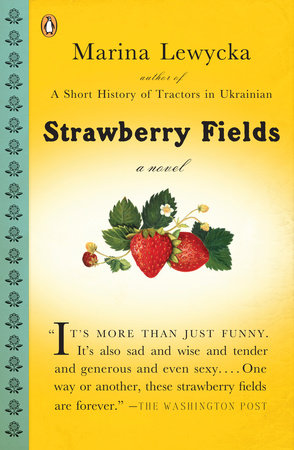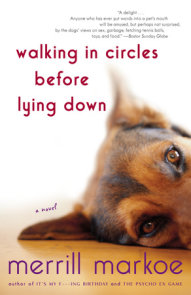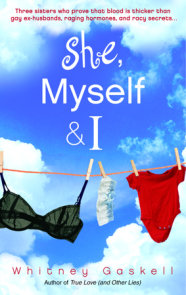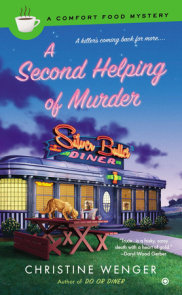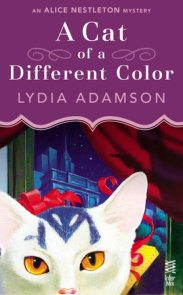READERS GUIDE
Questions and Topics for Discussion
INTRODUCTION
On a sunny hillside in Kent, in the Garden of England, a group of nine migrant workers from various parts of the world are picking strawberries for Mr. Leapish, the farmer. Housed in two trailers, and fed a daily diet of bread, margarine, jam, and sausages, life isn’t easy for them. But the friendships they forge, and their dreams of love and hopes for a new life in the West, carry them along.
Nineteen-year-old Irina has arrived from Kiev, Ukraine buoyed up by enthusiasm for the Orange Revolution, and full of dreams of a romantic and refined life in the West. Andriy, from Donetsk in Eastern Ukraine, has fled a harsher life—and maybe death—in one of its failing coal mines. Yola, the sharp-tongued but warm-hearted supervisor, has come from Poland with her gentle niece, Marta, to earn money to support her disabled son. Tomasz, also from Poland, is a latter-day aging hippie and Bob Dylan fan following his own dreams of freedom. With them are two Chinese girls and Emanuel, a devout young Catholic from Africa, seeking his sister, who is working somewhere in England as a nurse. The mysterious Vitaly, of unknown Eastern European origins, and a runaway dog round out the bunch.
Although the tone is often humorous, and the action moves fast, there is an underlying seriousness in this modern tale of globalization, where people are expendable, and the worst exploiters are often other immigrants, traffickers in cheap labor and worse, who prey on the vulnerable new arrivals.
Author Marina Lewycka creates comedy from the language and cultural differences of this ragtag group, while never flinching from describing the horrors they encounter when they are forced to leave their idyllic strawberry field and embark on an adventure which takes them through an England that turns out to be very different from the country of their dreams.
Strawberry Fields is both a road story and a love story. As each one of the original strawberry pickers is forced to let go of some of their illusions about life in the West, they gain friendship, love, and a better understanding of their own nature. Before they can finally extricate themselves from the clutches of the gang masters and go their separate ways, the group has the bittersweet journey of a lifetime, tinged with hope, joy, tragedy, and love.
ABOUT MARINA LEWYCKA
Marina Lewycka was born to Ukrainian parents in a refugee camp in Germany shortly after World War II. She and her family emigrated after her birth to England, where she grew up. Her first novel, A Short History of Tractors in Ukrainian, has sold more than one million copies worldwide, has been translated into more than thirty languages, and was nominated for the Booker and Orange prizes. She lives in Sheffield, Yorkshire, with her husband, and has one adult daughter.
A CONVERSATION WITH MARINA LEWYCKA
Q.The plot of Strawberry Fields is a raucous one and you tell it with a good deal of humor, but the political issues you address are real. To what extent did you intend your novel to be social commentary, or an exposé of the trials and travails of illegal immigrants? Did you choose a lighthearted tone on purpose? How do you hope that readers will react to the political and social issues you bring up?
A. Immigration is very much in the news in Britain at the moment, as it is in many prosperous countries, but it is always talked about in terms of statistics—so many thousand Poles, so many thousand Chinese, and so on. My modest aim in this book is to put a human face to some of those statistics, to tell the stories of a few of the people who find themselves adrift in the globalized labor market. We see the strawberries and the chicken pieces on our supermarket shelves, but we never really stop to wonder who put them there, or what those people’s lives are like. My aim is not so much to raise social and political issues as to give readers an invitation for a few hours to see the world through someone else’s eyes—someone who may have a very different background and culture from their own. That’s really all that an author can do.
Q. Your first novel, A Short History of Tractors in Ukrainian, was hugely successful. How was writing your second novel different from writing the first one?
A.Having written such a popular first novel made writing a follow-up very daunting. I was acutely aware that people would be watching to see what I did next, and there is also a nasty tendency, if someone has had success, to try to pull them down. So I decided to do something completely different. Strawberry Fields is much more of a fable or a fairy tale, and you have to read it in a different way from A Short History of Tractors in Ukrainian. But I hope I’ve captured some of the same directness and sense of fun that made my first book successful. ily disease. And as a structural element, it seemed a good way to get at some of the harmful patterns that move through families.
Q. What was the inspiration for writing about immigrants? Did you draw on any of your own experiences growing up? Were any of the characters based on people you have known?
A. One of the things about being an immigrant myself is that I grew up with an outsider’s perspective—although my own experiences were different from those of the characters in the book, I knew what it was like to be on the margins of a host society without ever quite fitting in. As a child, I picked peas in the Lincolnshire countryside with my mother, and though that was quite a harsh experience—the work was backbreaking and the wages were low—I don’t remember the harshness. What I remember is being close to my mother, out of doors in the beautiful Lincolnshire countryside, and the banter and camaraderie of the other pea pickers. So in Strawberry Fields I wanted to capture both the harshness and the beauty of that situation. Later, as a student, I picked strawberries, and I also worked as a waitress and a cook. Although I never worked in a chicken factory, I did work in a very disgusting sausage factory. So I knew not only that this was a story that needed to be told, but also that I was the person who had to tell it.
All of the characters are partly based on people I have known—Irina and Andriy are modeled on people I met on my visits to Ukraine, and we have plenty of Polish people in Sheffield. I used to teach a lot of Chinese and Malaysian students, so that part of the story was in a way based on experience, and my daughter works in Malawi, and on one visit I met a young man on whom Emanuel is based. Even Dog is based on a real dog.
I must say that I also owe a great debt of gratitude to Geoffrey Chaucer in creating the characters. The Canterbury Tales is one of my favorite books, and once I knew that my story was to be partly based in Canterbury, and that it was going to be a road story, I thought it would be fun to include a homage to Chaucer. He is so clever at sketching in the characters and giving them distinct personalities in just a few phrases. All of my characters in Strawberry Fields have a Canterbury Talesequivalent. Sometimes it is quite clear—for instance Yola is a latter-day Wife of Bath—but sometimes the clue is just a reference to a detail of dress. You don’t need to be a Chaucer fan to enjoy these characters, but if you are there is something extra for you. Actually, the real mystery character is Tomasz—I wonder whether anyone can work out which of the Canterbury pilgrims he represents.
Q. Dog is one of the most sympathetic characters in the book, and he has a wonderful personality of his own. And your version of dog-talk is inspired. How did you decide to include Dog as such an important character?
A. The real dog, on whom Dog is based, was called Paddy and belonged to a close friend of mine who lived in Derbyshire. We would often go walking with him in the beautiful Peak District. My friend told me that he was a runaway who had arrived on their doorstep late one night, panting and bleeding. He was clearly running away from something, but of course being a dog he couldn’t say what. I became fascinated with the dog’s story and tried to imagine the adventures he’d had; and I tried to imagine what it would be like to perceive the world primarily through your senses of smell and hearing. When I knew that my book was going to be about a pair of lovers on the run, I realized that they would also have to have a dog who was on the run.
I knew that he would perceive things mainly as happening in the present, and have only a hazy sense of the past, and little sense of the future. I knew that he would not be very articulate, but the one thing he would always be certain of was his own dogness. That’s why he begins and ends every episode with the statement I AM DOG.
Q. Irina may be the heroine of the story, but you give a lot of time to the voices and views of the other characters. While some of the characters speak in the first person, you tell others’ stories in the third person. One character’s story is even told exclusively through his letters to a sister. How did you pick each character’s voice? Did you start writing with the idea of different voices in mind, or was it something that developed as you went?
A. When I started to write Strawberry Fields, I was going to tell it from the point of view of a single all-knowing narrator. But I found it seemed very lifeless, and I realized that the only way to bring the characters to life was to make them speak for themselves. With so many characters, I knew it could be confusing for the readers, so I made every voice distinctive in terms of person, tense, vocabulary and mode of address, and I took care at the start of every change of voice to flag up who it was who was now speaking. I personally hate to read books where I can’t tell what’s going on, so I tried to make it as plain as possible.
Q.Strawberry Fields includes a lot of information about agriculture, especially strawberry and chicken farming. Where did you get your facts from? Did you do a lot of firsthand research?
A. I did get a lot of help from two farmers in Kent—a chicken farmer and a strawberry farmer—but their operations were far from the horrible exploitative situations I have described. For these, I turned for detail to an organization called Compassion in World Farming, which campaigns about the conditions in which livestock are kept, and they provided me with much detail about what happens on chicken farms, and were even able to send me a video. The trade unions who organize migrant workers in the UK were able to give me very precise details about the scams and hazards faced by migrant workers with a poor grasp of English. Of course some of the worst abuses, like those of the Morecambe Bay cockle pickers, have also been widely reported in the press over here.
Q.When you write, do you develop special relationships with your own characters? Did you have a favorite in this book?
A. Although Irina is the first-person narrator of this story, she is very different from me—maybe she is more like I was when I was nineteen and convinced that I knew everything. I found her knowingness both irritating and amusing. And I was also a bit irritated by Andriy’s constant pessimism. I thought they were a pair of opposites who really needed each other to be complete, and just had to end up falling in love. But they seemed so hopelessly contrary that I did find myself worrying about them when I was away traveling a lot, and not able to spend time with them. I would wonder how they were doing, and how I was finally going to be able to get them together.
Q.Your characters, in general, don’t have a very firm grasp of English, but they invent some wonderful phrases—devil’s bum, poky-nose, and “make possibility” as a euphemism for sex, to name a few. What was your inspiration for these invented words?
A. I grew up among people who invented their own language as they went along, so I guess it must come naturally to me. The words someone chooses often say more about them than about the thing they are describing.
Q.What are you reading now? What books have been most important to you over the years?
A. I’ve just started Orlando Figes’s The Whisperers, about family life in Stalin’s Russia. He is an extraordinary writer, who combines painstaking research with the psychological depth and empathy of a novelist. As a fiction writer, I find myself spending a lot of time reading non-fiction, to gain background material for my books.
I studied English Literature at university, but because of the options I selected, my knowledge ends round about 1700. So Shakespeare was hugely important to me, as was Chaucer, and Milton, and the Metaphysical poets. I also draw inspiration from Charles Dickens and James Joyce and, of course, the great Russian novelists.
Q.Do you have any more projects in the works?
A. I’m about halfway through my third book. It’s about an old lady who lives in a crumbling house in London with seven cats. But it’s also an oblique discussion of the situation in the Middle East, and the dispute over Palestine and Israel. What makes me think I can write a comedy about something as deadly serious as this? I must be crazy.
DISCUSSION QUESTIONS







